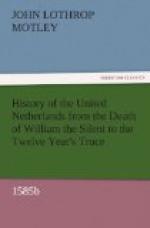Yet that traffic still went on. It would have continued until Antwerp had been victualled for more than a year, had not the city authorities, in the plentitude of their wisdom, thought proper to issue orders for its regulation. On the 25th October (1584) a census was taken, when the number of persons inside the walls was found to be ninety thousand. For this population it was estimated that 300,000 veertell, or about 900,000 bushels of corn, would be required annually. The grain was coming in very fast, notwithstanding the perilous nature of the trade; for wheat could be bought in Holland for fifty florins the last, or about fifteen pence sterling the bushel, while it was worth five or six florins the veertel, or about four shillings the bushel, in Antwerp.
The magistrates now committed a folly more stupendous than it seemed possible for human creatures, under such circumstances, to compass. They established a maximum upon corn. The skippers who had run their cargoes through the gauntlet, all the way from Flushing to Antwerp, found on their arrival, that, instead of being rewarded, according to the natural laws of demand and supply, they were required to exchange their wheat, rye, butter, and beef, against the exact sum which the Board of Schepens thought proper to consider a reasonable remuneration. Moreover, in order to prevent the accumulation of provisions in private magazines, it was enacted, that all consumers of grain should be compelled to make their purchases directly from the ships. These two measures were almost as fatal as the preservation of the Blaw-garen Dyke, in the interest of the butchers. Winter and famine were staring the city in the face, and the maximum now stood sentinel against the gate, to prevent the admission of food. The traffic ceased without a struggle. Parma himself could not have better arranged the blockade.
Meantime a vast and almost general inundation had taken place. The aspect of the country for many miles around was strange and desolate. The sluices had been opened in the neighbourhood of Saftingen, on, the Flemish side, so that all the way from Hulst the waters were out, and flowed nearly to the gates of Antwerp. A wide and shallow sea rolled over the fertile plains, while church-steeples, the tops of lofty trees, and here and there the turrets of a castle, scarcely lifted themselves above the black waters; the peasants’ houses, the granges, whole rural villages, having entirely disappeared. The high grounds of Doel, of Kalloo, and Beveren, where Alexander was established, remained out of reach of the flood. Far below, on the opposite side of the river, other sluices had been opened, and the sea had burst over the wide, level plain. The villages of Wilmerdonk, Orderen, Ekeren, were changed to islands in the ocean, while all the other hamlets, for miles around, were utterly submerged.




